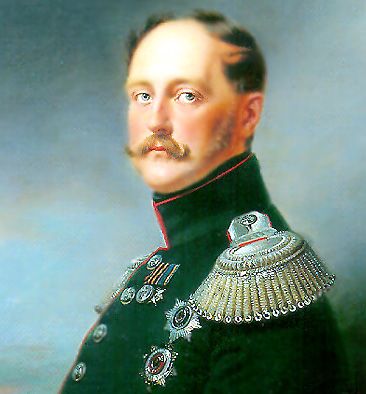
Nicholas I (1825-1855)
 |
Alexander appointed his eldest brother Constantine his successor in 1823, but the heir detested the idea of leaving his family in Warsaw and going to St.Petersburg. So Alexander bequeathed his crown to Nicholas - the third son of Emperor Paul I born on May 25, 1796. Nevertheless, he accepted sovereignty and was crowned on August 22, 1826, in the Dormition Cathedral of the Moscow Kremlin, shortly after the Decembrists’ Uprising.When Nicholas was declared a tsar in 1825, the conspirators rallied the soldiers to support the older brother Constantine, who had given up the right to the throne, in the hope that he would be more open-minded and would undertake necessary reforms. |
And although there was no detailed plan of action, the conspirators made several troops come to the Senate square in the morning of December 26 and intended to publicize manifesto, announcing monarchy overthrown, a provisional government established and selfdom abolished. The confrontation between the conspirators’ troops and troops loyal to the tsar lasted for five hours, and at dusk Nicholas ordered to fire on the rebels, killing hundreds before the leaders surrendered. They were taken to the Winter Palace by night, and faced the law court after several months of extremely harsh interrogations. As a result five people were hanged; and over a hundred exiled to Siberia. The execution of the participants in the uprising was Nicholas’ first measure as Emperor, but despite all he fairly soon won society’s sympathies since he was honestly working to make the law compiled with, strengthened and centralized bureaucratic structures to an unprecedented degree, and promised other reforms, besides he did his utmost to finish what Alexander had started. Thus appeared the 181 Gallery in the Winter Palace, the General Staff building and the Foreign Ministry, the Alexander column, churches of Preobrazhensky and Izmailovsky Regiments, Mariinsky and Belosselsky-Belozersky Palaces. The principal issue in foreign policy was the "Eastern Question," maintaining pro-Russian regimes in the Black Sea Straits. Nicholas attempted to resolve this by the partition of the Ottoman Empire, but the vast empire was unable to mobilize, equip, and transport enough troops to defeat the medium-size French and English forces under mediocre command. The result was the Crimean War of 1853-1856, in which Russia suffered a bitter defeat at the hands of a coalition of Western European states and Turkey. This war was Nicholas’ personal tragedy - he was sobbing like a child on receiving news of the defeat of Russian forces at Evpatoria - that is why when his death was announced on February 18, 1855, rumors of his suicide started to appear and many people believed the Tsar poisoned himself. The eldest son of Emperor Nicholas I, Alexander was to get the crown.
|
Copyright © 2004-2005 Palytra Travel
All rights reserved |
Website development |

